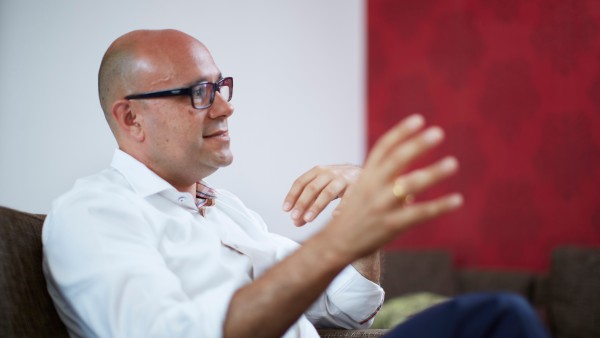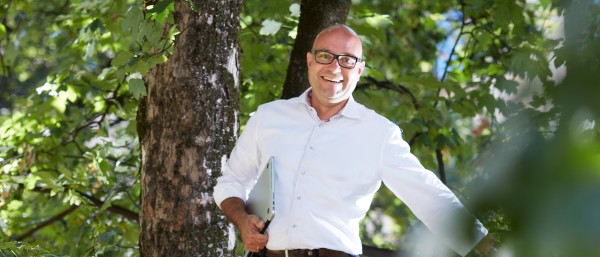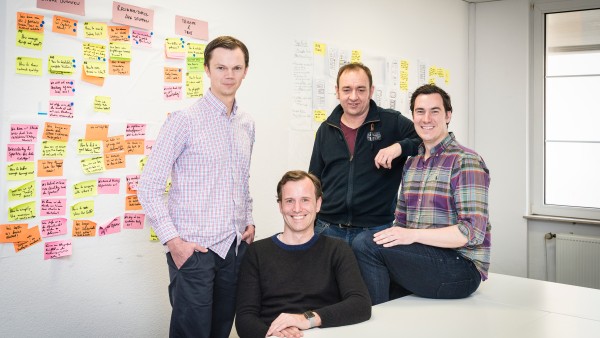KfW has been investing in private VC funds since 2015, for example in Forbion, a company that supports young high-tech companies.

Selective
Holger Reithinger invests solely in biotechnology, medical technology and diagnostics. With a doctorate in biochemistry, he is an expert in the field.
Mr Reithinger, have you already been contacted by a start-up today?
Actually somebody did call today. We will take a closer look at the gentleman's idea. However, spontaneous calls are rare, the founders usually send a presentation.
How high is the probability that you will provide him with capital?
We get about 600 inquiries per year – but we only make two to five investments, exclusively in biotechnology, medical technology and diagnostics. Raising funds with us is therefore a major challenge for a new entrepreneur.
Why is that the case?
There are plenty of business founders with intelligent ideas, but not every idea is suitable for venture capital financing. In order to cushion the high risks, we can only invest in companies with a very strong technological lead and with products that address large markets and are likely to generate high profits. In order to find such companies, we also look for them ourselves, visit conferences and universities, and use our contacts.
In the United States, there are many television shows with venture capital funds competing for young start-ups. In Germany, this type of financing is considered gambling. Why?
Venture capital as we understand it today was invented in America; technology companies such as Intel, Google or Apple were initially financed this way. While the Americans are thus able to draw on more than 50 years of experience with venture capital, Germans still tend to rely on bank financing. Americans are also more ready to take risks – and more aware of the risks they are taking. The dotcom bubble in 2000 left no lasting damage on the US VC market. The German market, on the other hand, has not fully recovered from this shock. Venture capital is therefore still on the back burner in Germany. We need patience.
Patience does not generate high returns, though …
This is why we still have to make many connections, not only to companies, but also to universities and throughout society as a whole. We urgently need private capital. German investors typically invest in real estate, container ships or wind farms, but hardly anybody invests in young technology companies.
About Forbion
Sector focus: life sciences
Fund volume: EUR 700 million
Phases: early phase and growth financing
Portfolio: Curetis, Exosome Diagnostics, Rigontec
Exits: Akarna (Allergan, 2016), Dezima (Amgen, 2015), PneumRx (BTG, 2014), Santaris (Roche, 2014)
Founded in 2000 as ABN Amro Capital Life Sciences, renamed in 2006
Locations: Naarden (Netherlands, head office), Munich
Funds with KfW involvement: FCF III
Where is demand in the German start-up market particularly high?
Traditionally, venture capital is meant for high-tech start-ups. However, once product development has been completed, the companies need big money to market their products internationally. The gap in bridge financing is particularly wide in Germany. In other countries – such as France, Belgium or the Netherlands – this type of growth financing can also be raised on the stock exchange. In Germany, we don't have much of a stock exchange culture.
Under these circumstances, is it possible at all for an interesting VC scene to develop?
Germany has a lot to show for itself: we're a high-tech country with many patent applications, the government invests in research and in early-phase corporate financing, and there is a very active start-up scene. Nevertheless, the transfer of technology from the universities to the start-up scene runs much more smoothly in other countries. The government could also systematically promote private investment – not in yet another item of real estate – but in companies that develop molecular diagnostic processes, for example, And the tax framework needs to be improved to attract new funds.
KfW invests in VC funds. What can a promotional bank achieve in this segment?
KfW is an investor that brings calm. And it is in it from the long game. It can thus give important signals and attract private capital. The French promotional bank BPI is also increasingly investing in the French venture capital market, which is currently performing well.
You are the first fund KfW has invested in. How did you convince them?
We have been on the market for a very long time and our team comprises doctors, biologists and biochemists; only four of our employees have a financial background and that distinguishes us very much from banks and private equity investors.
How do you start a fund in the first place?
With an idea that will have to convince the investors. In our capital-intensive sector, a fund needs about EUR 70-100 million in order to make a meaningful start. For risk diversification purposes, the funds are invested in about 13 to 16 different companies. We start investing before we have raised the entire amount. This allows potential investors to assess how interesting our company is, and who the other investors are.
Who are the potential investors?
Investors need to be prepared to invest at least two million euro and to possibly wait ten years before they get their money back. If everything goes according to plan, they can earn a very high return on their capital. And they also feel great, because they invested in technology which could mean the breakthrough in cancer research, for instance. But we are venture capital investors: the possibility of a complete loss cannot be ruled out.
What are the exit strategies you pursue at Forbion?
Ideally, we float the company on the stock market after a few years –which is what we did with the German diagnostics company Curetis, for example – or we sell it to a larger group, like we did last August when we sold Akarna to the American company Allergan. Sometimes the company is profitable enough for another investor to buy us out. But that doesn't happen very often.
What does your current portfolio look like?
We currently have about 30 companies in our portfolio – distributed across three main funds. About two thirds are in Europe and one third in the US. Geographic diversification is another key aspect of risk management. In Germany, we have invested in six companies – for example in the start-up Rigontec in Bonn, which is pursuing a globally unique immunotherapeutic approach to combat cancer.
Published on KfW Stories: Tuesday, 5 September 2017





Data protection principles
If you click on one of the following icons, your data will be sent to the corresponding social network.
Privacy information